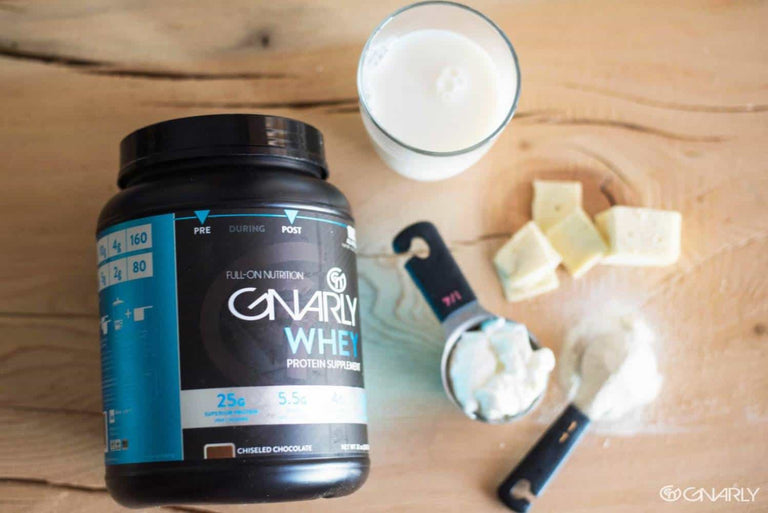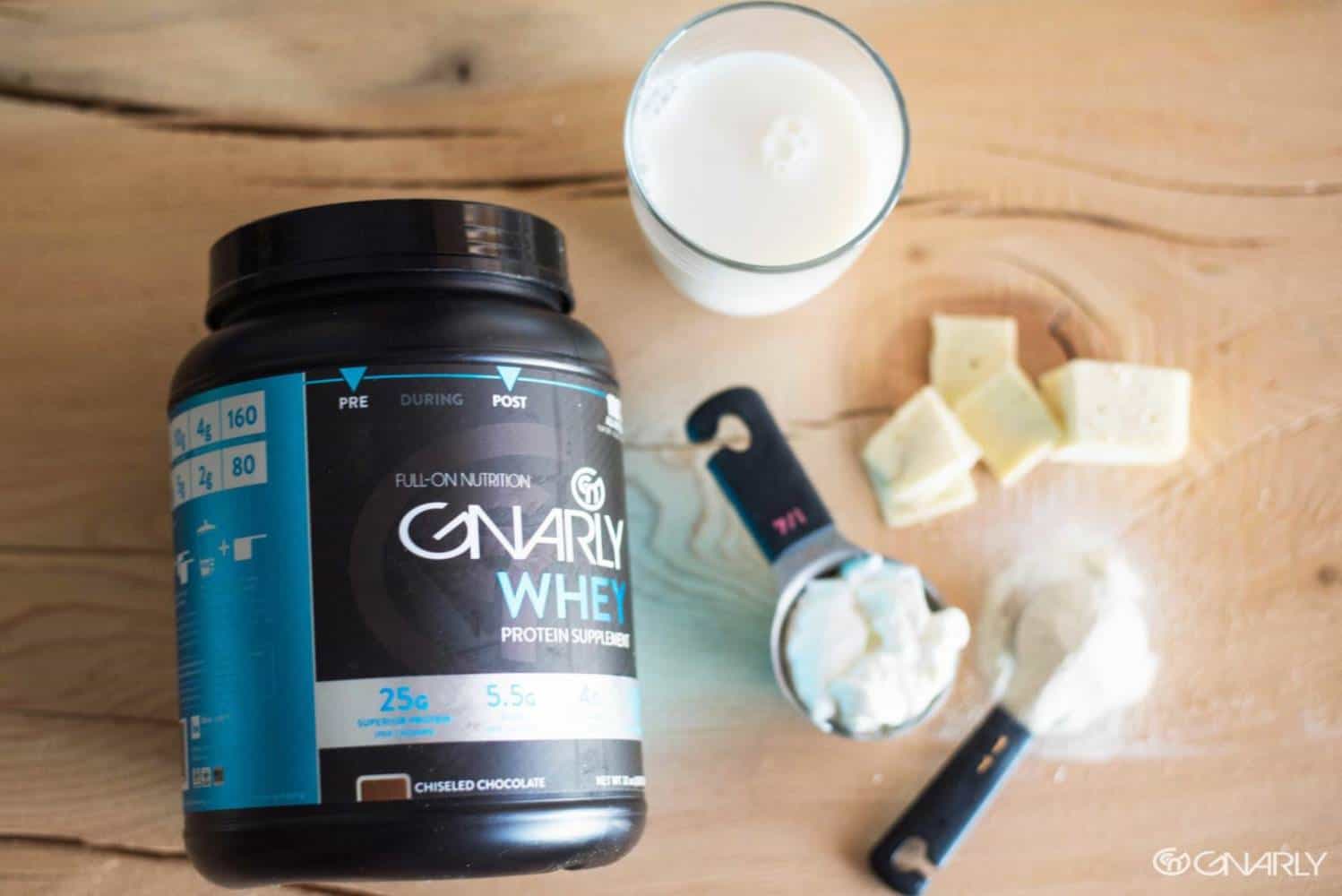Whey is, by far, one of the most widely taken and thoroughly studied supplements out there. In fact, whey tends to straddle an odd line between sports supplement and food item – being so nutritious that it’s hard to tell which side it really falls on. Still, as with anything, people sometimes wonder, “What are some of the whey protein side effects that I should know about?”
So, let’s look into this popular supplement and try to answer this question. Before we talk about some potential whey protein powder side effects, you should understand what whey is. Once we know where whey comes from, our discussion about whey protein dangers will make much more sense.
The Beginning
Oddly enough, whey is a by-product of the cheese making process, and, for a long time, was a bit of a nuisance. In it’s natural state, whey is a cloudy, bitter liquid that cheese makers had a hard time getting rid of once it had been separated from the milk solids that go on to become cheese. Whey was used as fertilizer, fed to animals and generally tossed anywhere nutrition was needed without concern for taste.
Once it was learned that whey could be dried and powdered, however, everything changed. Now, the unpleasant flavor can be minimized and easily be mixed with other liquids as a way to provide all that nutrition without any of the unpleasantness that plain, liquid whey brings with it. This is important information in a discussion on whey protein side effects, because of one key element that often gets forgotten; whey comes from milk.
Assuming that you are using a quality whey protein, it should have a minimum amount of additives. Although many are stuffed with dyes, preservatives, and additives (but we’ll get to that later). When considering any possible whey protein powder side effects, then, the real question is: Is milk safe? This might seem like a silly question but there are valid reasons to ask it. Let’s consider a few factors that could actually lead some to worry about whey protein dangers.
Contaminants
Whey, when properly sourced from grass-fed, organic cows has never been shown to contain any harmful substances. Let’s just make that plain.
That does not guarantee, however, that improper processing or poor sourcing will not cause problems in some whey products. In 2010, for example, Consumer Reports tested 15 popular protein drinks and found that several of them contained “low to moderate” levels of harmful heavy metals such as arsenic, cadmium, and lead. Three products stood out as special concern in the review, since many users take several servings each day – exposing them to very high level of these dangers substances.
Again, these metals are not found in whey naturally when it has been produced and sourced properly.
Additives
Modern food is full of a host of surprising and fairly unpleasant additives. And, while we don’t like to think of certain substances – like extract of beaver glands or wood pulp – making their way into our foods, few of them have actually been shown to be harmful. Even if they are really gross.
Some additives, however, should be avoided according to some sturdy scientific evidence. For example, several artificial sweeteners have been strongly linked to obesity, diabetes, and heart disease. Although, for a long time the link didn’t make any sense. Many of these sweeteners are calorie free, so how can they cause obesity, or create the elevated insulin levels needed to cause type II diabetes?
As it turns out, artificial sweeteners actually change the populations of microbes living in our digestive system in a way that greatly impacts the way we process foods. For one thing, these microbes should be helping to digest food, produce nutrients, and protect us from infection. Under the influence of artificial sweeteners, though, they misbehave. Among other things, the changed microbes actually produce excess calories and simply do not do their jobs. In turn, this leads to obesity, diabetes, and an over all decreased sense of well-being.
There’s also some research to suggest that artificial sweeteners can increase the risk of certain cancers, those these findings are mixed and somewhat controversial. But, really, is it worth the gamble?
Food dyes have also had a less-than-stellar record. And, since whey on it’s own isn’t typically a very appealing color, these additives are a common ingredient in whey protein powders. One 2007 study found that children who consumed drinks that were artificially dyed were more likely to develop ADHD and other behavior problems. While these findings have been contested and not replicated in adults, it’s still a cause for concern. Especially since there are safe, nature ways to change the color of whey.
There are also a host of preservatives and anti-caking agents that have been linked to all sorts of problems. Butylated Hydroxyanisole disrupts hormone signals. Sodium Nitrates have been linked with an increased risk of cancer, obesity, heart disease and diabetes. Sodium and Potassium Benzoate are known carcinogens and can cause serious thyroid damage. And these are just a few examples.
Of course, not all of the additives in whey protein are harmful chemicals. Some are just things you may not want. For example, soy is sometimes used as a filler in products labels as “whey” because it’s cheaper and will still increase the protein content of the final mix. Be mindful of whats on the ingredients label and make sure that you’re getting only what you want out of your whey protein powder.
Possible Interactions
Although quality whey protein powders are generally considered safe, it is possible for them to have negative interactions with certain conditions and medications.
Whey can cause a slight decrease in blood pressure which, in a healthy person is negligible. If you already have concerns in this area or are on blood pressure medication, the drop in blood pressure could be a cause for concern. For similar reasons, individuals on blood thinners should speak with their doctor before taking whey.
One of the benefits of whey is that it has shown promise as a way to prevent and treat type II diabetes by it’s moderation of blood sugar levels. Unfortunately, in conjunction with other diabetes medications, this decrease in blood sugar can be dangerous in diabetics.
Because whey is derived from milk, it does contain a certain amount of lactose which may cause adverse reactions in people who are lactose intolerant.
That being said, there is no evidence regarding whey’s safety during breast feeding. Giving the fact that most women likely eat whey in other forms without being aware of it – and that whey is present in human breast milk – it is likely safe for the infant. It’s also important to note that many infant formulas contain various forms of whey. Of course, there is a slight chance of an allergic reaction in the child, even if the mother does not have the same allergies.
Side Effects
For the most part, whey has no side effects in otherwise healthy people. It is common, however, for high protein foods to cause some digestive discomfort. This is annoying and possibly painful – but is completely harmless. If you experience this sort of pain after taking whey, consider taking a smaller dose until you’ve established your tolerance. You may also find it useful to adjust the times at which you take your whey. For example, you wouldn’t want to go to the gym while having any sort of digestive problem, so if whey gives you issues, take it with enough time for these symptoms to subside. Or take it after you exercise.
You may sometimes encounter concerns that whey protein powder – or too much protein from any source – is bad for your kidneys, liver, bones, heart or even that it causes cancer. In healthy individuals with properly functioning organs, there is no evidence to support these concerns unless protein intake reaches ridiculously high levels. But this is possible with any protein source and is not limited to whey.
There is also no evidence to support the idea that an increased protein intake can damage your bones or give you cancer. In large part, these claims are based on out-dated or otherwise faulty research that has since been thoroughly debunked.
Ultimately, whey is safe and, compared to many other supplements, has very little danger associated with it. Whey is a naturally occurring source of quality protein found in milk, cheese and other dairy products that people eat on a regular basis – and these things cause no concern in the vast majority of people.
In truth, the problems occur in low-quality supplements that are either sourced from cows that are kept in poor conditions, irresponsibly processed or stuffed with additives. If you stick to a quality, grass-fed whey, with natural ingredients, you most likely have absolutely no whey protein powder side effects to worry about.




